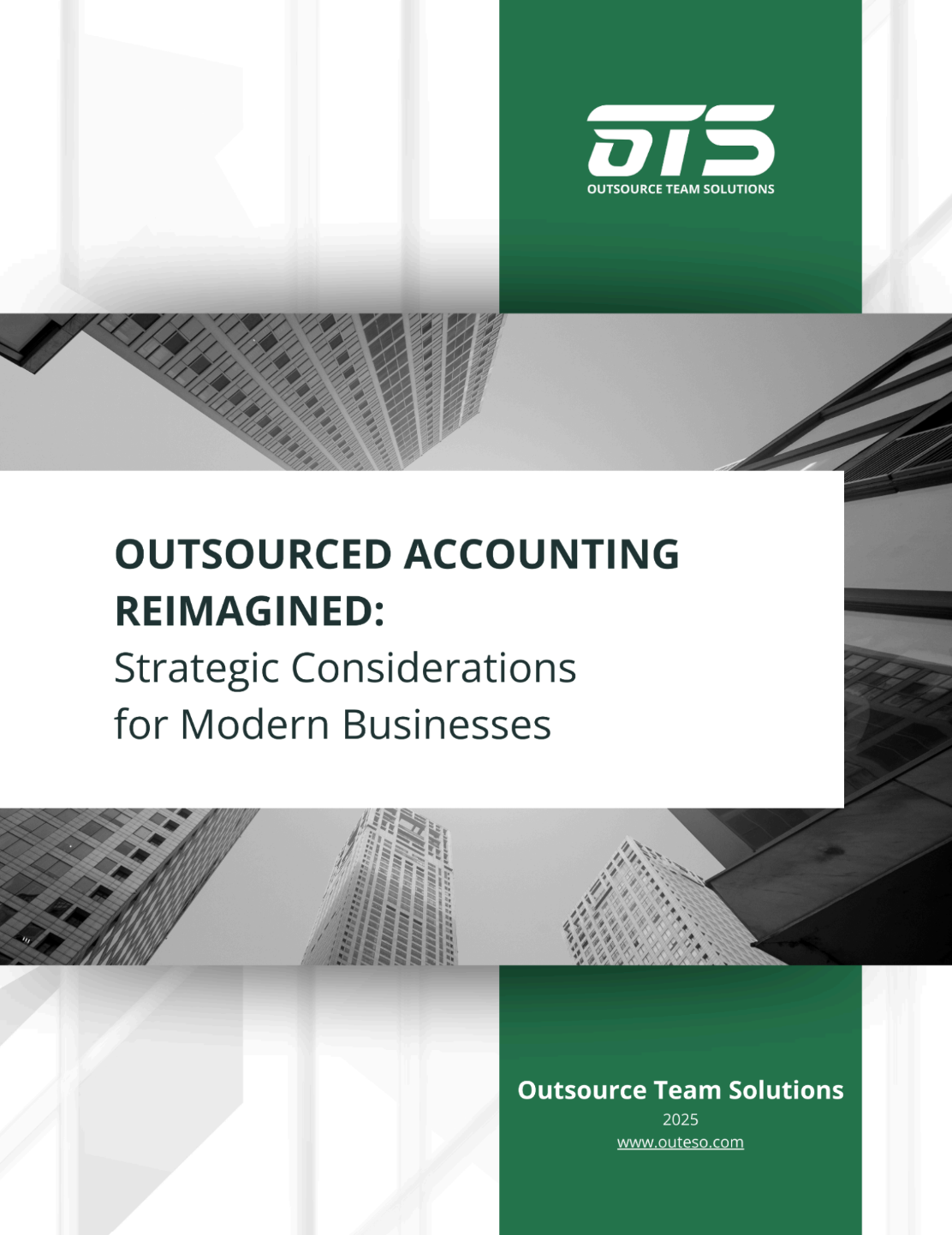The Strategic Advantage: Why Tax Preparation Outsourcing Is Becoming Standard Practice
- Outsource Team Solutions
- Apr 23, 2025
- 5 min read
Updated: Jun 20, 2025

Accounting firms face mounting pressure to deliver accurate, timely tax services while simultaneously managing and growing their practice. This challenge has given rise to a transformative solution that continues to reshape the accounting industry: outsourcing tax preparation services.
From independent CPAs to prestigious accounting firms, professionals across the spectrum are discovering that external tax preparation partnerships deliver substantial benefits. This strategic shift represents a fundamental evolution in how accounting practices operate, creating sustainable advantages that position firms for long-term success.
Tax Preparation Outsourcing Model
Tax preparation outsourcing involves partnering with specialized external providers who manage and process tax documents for your clients. Rather than hiring seasonal staff or requiring existing team members to work excessive overtime during tax season, accounting firms can leverage dedicated tax specialists who focus exclusively on preparing accurate returns.
These specialized providers can handle the entire process—from organizing documentation to applying the latest tax regulations—while maintaining the high standards your clients expect. The outsourcing firm manages all aspects of talent recruitment, training, and quality control, allowing your practice to maintain focus on relationship management and strategic advisory services.
Eight Strategic Benefits Driving the Outsourcing Trend
1. Operational Efficiency Transformation
The traditional tax season model often forces senior accountants to divert attention from high-value activities to manage the logistics of tax preparation. This seasonal disruption can significantly impact a firm's ability to pursue growth opportunities and maintain service quality.
Outsourcing tax preparation fundamentally transforms this dynamic by allowing firm principals to maintain strategic focus year-round. With routine tax preparation handled externally, accounting professionals can allocate more time to developing client relationships, identifying new business opportunities, and delivering specialized advisory services that command premium fees.
According to industry analysis, firms that implement outsourced tax preparation models report a 20-30% increase in time available for business development activities during tax season.
2. Specialized Expertise Access
Tax regulations undergo continuous evolution, with yearly updates introducing new compliance requirements and planning opportunities. We believe accounting firms demand a partner who has deep expertise and values continuous education.
This specialized focus ensures your clients benefit from tax preparers who:
Maintain comprehensive knowledge of federal, state, and local tax code changes
Specialize in specific industries or tax situations
Undergo continuous professional education focused on tax preparation
Apply specialized knowledge to identify legitimate deductions and credits
Tax preparation specialists operate within a collaborative environment where complex questions receive immediate peer review, reducing the likelihood of interpretive errors that might occur when practitioners work in isolation.
3. Financial Efficiency Advantages
Outsourcing tax preparation frequently delivers significant cost advantages compared to traditional in-house models. The direct cost savings derive from multiple sources:
Elimination of seasonal hiring expenses, including recruitment, onboarding, and training
Reduction in overtime compensation of full-time staff during peak tax periods or having to maintain full-time staff during off-peak periods
Lower physical space and other directly related operating expenses requirements for seasonal staff
Reduced management overhead for supervision and quality control
4. Enhanced Accuracy Protocols
Quality control represents a critical concern for accounting firms, particularly during high-volume tax seasons when time constraints may impact performance. Dedicated tax preparation specialists operate within systems designed specifically to maintain precision under deadline pressure.
Tax preparation outsourcing firms implement multi-layered quality assurance processes that typically include:
Specialized review protocols for different tax scenarios
Multiple verification checkpoints before finalization
Automated cross-checking against previous year returns
Systematic identification of common error patterns
Continuous feedback loops for process improvement
These specialized quality systems often exceed what most accounting firms can implement internally, particularly during high-volume periods when resources are stretched thin.
5. Advanced Documentation Management
Effective record-keeping constitutes a fundamental aspect of tax practice, with significant implications for client service quality and regulatory compliance. Outsourced tax preparation partners typically employ standardized documentation systems that enhance organization and accessibility.
These systems deliver several distinct advantages:
Consistent file naming conventions that facilitate rapid retrieval
Standardized organization structures that minimize search time
Secure digital storage with appropriate encryption protections
Clear documentation of all client communications and authorizations
Maintain documents within your firm's systems
The standardization inherent in professional outsourcing operations enhances both immediate accessibility and long-term record management, reducing the administrative burden on your internal team.
6. Business Scalability Enhancement
Traditional tax preparation models can create barriers to growth, as capacity constraints during peak periods often force firms to decline new business. Tax preparation outsourcing removes these constraints, creating flexibility to expand client relationships.
This scalability extends in multiple directions:
Ability to accept new clients during traditionally capacity-constrained periods
Ability to concentrate on higher-margin services
Capacity to handle unexpected volume increases from existing clients
Flexibility to expand into new service areas without staffing concerns
Capability to manage temporary reductions in volume without carrying excess capacity
Adaptability to changing business conditions without major infrastructure adjustments
By transforming fixed capacity constraints into flexible resources, outsourcing creates significant competitive advantages for growth-oriented firms.
7. Client Experience Elevation
Clients expect responsive and knowledgeable service, regardless of seasonal fluctuations in business. When accounting firm principals find themselves overwhelmed with tax preparation management, client experience often suffers.
Outsourcing tax preparation allows for consistent client engagement by:
Freeing principals to maintain regular client communication
Ensuring tax questions receive prompt, accurate responses
Maintaining service consistency throughout peak periods
Providing specialized expertise for unique client situations
Delivering predictable turnaround times regardless of seasonal volume
8. Strategic Advisory Expansion
The most significant long-term benefit of outsourcing tax preparation may be the opportunity to offer higher-margin advisory services. With routine compliance work handled externally, accounting professionals can focus on forward-looking tax planning that delivers measurable financial benefits.
This strategic shift enables firms to:
Develop comprehensive tax minimization strategies for key clients
Identify planning opportunities related to business transitions or expansions
Create estate and succession planning frameworks that optimize tax positioning
Structure compensation and benefit programs to maximize after-tax value
Design entity structures that align with both operational and tax objectives
These advisory services not only command premium fees but also strengthen client relationships by demonstrating measurable financial value beyond compliance activities.
Embracing the Future of Tax Practice
The evidence demonstrates conclusively that tax preparation outsourcing represents not merely a temporary trend but a fundamental evolution in accounting practice management. The combined benefits of operational efficiency, specialized expertise, financial advantages, and enhanced client service create compelling incentives for firms of all sizes.
Forward-thinking accounting practices recognize that outsourcing routine tax preparation creates competitive advantages that extend far beyond seasonal workload management. By strategically reallocating professional resources toward high-value advisory services, these firms position themselves for sustainable growth in an increasingly complex financial environment.
As client expectations continue to evolve and regulatory complexity increases, tax preparation outsourcing will increasingly distinguish thriving, growth-oriented firms from those constrained by traditional operational models.
To learn more about how strategic tax preparation outsourcing can transform your practice, contact our team today for a personalized consultation on implementing this approach within your firm's specific context.











